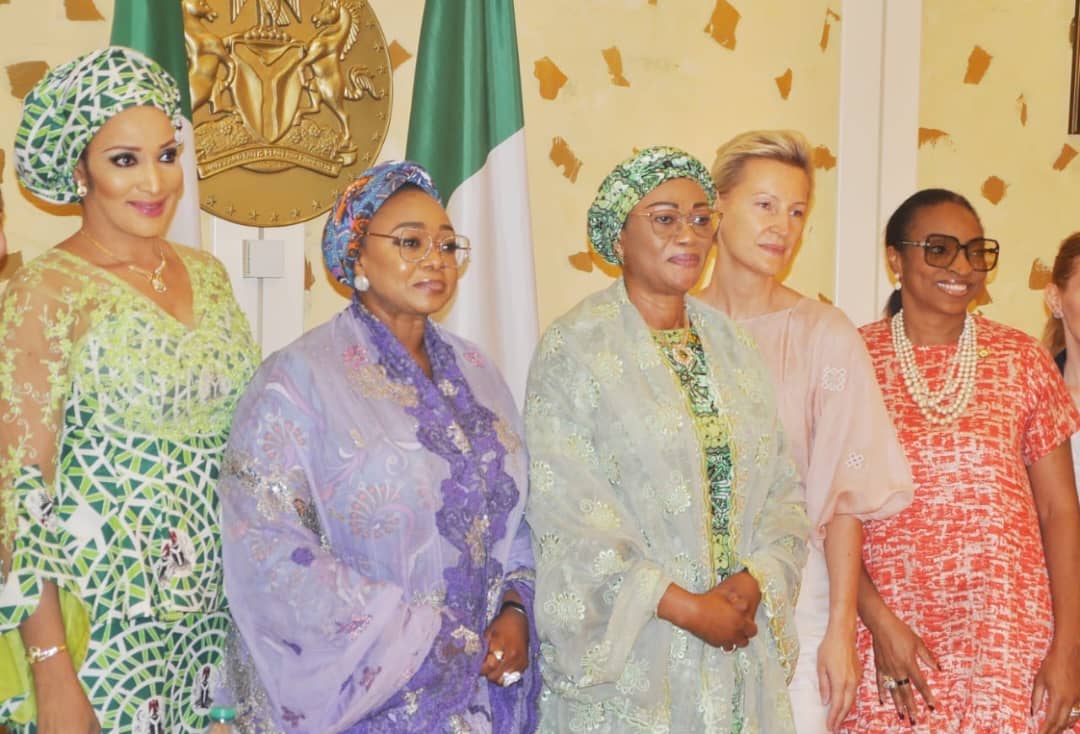By Tokunbo2
Copyright thesun

Assures of complementary and supportive role
Russia’s BRICS Women’s Business Alliance donates maternity kits
From Juliana Taiwo-Obalonye, Abuja
First Lady of Nigeria, Oluremi Tinubu, has described Nigeria as the best ally to the BRICS countries.
BRICS is a forum for cooperation and coordination among a group of emerging economies, currently consisting of Brazil, Russia, India, China, South Africa, Egypt, Ethiopia, Indonesia, Iran, and the United Arab Emirates.
Speaking on Tuesday while welcoming the Russian Chapter of the BRICS Women’s Business Alliance at the State House in Abuja, the First Lady affirmed Nigeria as “a very interesting place” brimming with opportunities for global partnerships.
Speaking to the visiting delegation led by Chairperson of the BRICS Women’s Alliance, Anna Nesterova, Mrs Tinubu pledged her office’s unwavering support to initiatives that empower women and entrepreneurs while clarifying the functional roles of her office and government ministries in realising business engagements.
“Nigeria is a very interesting place that you will find rewarding for partnerships,” Mrs Tinubu declared. “My office will continue to provide advocacy and encouragement, but the ministries have the statutory responsibilities and budgets to support your mission.” She underscored the complementary nature of her role: “I do a lot of programmes through my foundation, but when it comes to women’s empowerment and entrepreneurship, the ministries are the right partners. My role is to complement, advise, and facilitate.”
The First Lady highlighted her personal humanitarian commitments, emphasising her work with the Renewed Hope Initiative and other charities benefiting women, children, and families. “My personal passion is running humanitarian programmes that focus on those areas,” she explained.
Reflecting on her recent 65th birthday, she shared, “I dedicated the milestone to raising funds for a national library project close to my heart,” disclosing other charitable causes, including providing sanitary kits for young women in rural areas. She revealed plans to personally deliver sanitary towels to schoolgirls in Gombe, saying, “In a few day,s I will be on my way to Gombe to hand out sanitary towels to young women from rural communities. I have to pay for that out of pocket or with whoever supports my charity.”
Nesterova, earlier commended the First Lady’s leadership, describing her as “an incredible woman who not only changes lives for the better but also paves the way for a prosperous future for the Nigerian people.”
She announced the Alliance’s plans to establish a BRICS Women’s Business Alliance Regional Office in Nigeria to serve as “a gateway for Nigerian women entrepreneurs to international markets” and to create a “single-window collaboration hub for BRICS partners”.
Nesterova elaborated on the Alliance’s expanding reach, noting, “Our Common Digital Platform currently connects more than 3,000 businesswomen from 60 countries, and last year, the BRICS Women’s Startups Contest attracted 50 applications from Nigeria alone.”
She also announced a humanitarian gesture: “We are donating 1,000 labour and delivery kits to Nigeria as part of our efforts to support maternal health and deepen people-to-people ties.”
The Russian delegation accompanying Nesterova included senior business leaders and academics like Ms Liudmila Shcherbakova of VET PHARM Group, Ms Natalia Vershinina of United Migration Centre, Prof Liudmila Popova of Orel State University, and Ms Anna Meshcheryakova of Third Opinion AI, who collectively expressed readiness to collaborate across sectors, including pharmaceuticals, labour mobility, financial literacy, and AI-driven healthcare solutions.
Following the courtesy visit, the delegation joined government officials at the State House Banquet Hall for a technical session focused on “Strengthening Bilateral Ties and Exploring Investment Opportunities between Nigeria and Russia”.
In her welcome address, Minister of State for Foreign Affairs Ambassador Bianca Odumegwu-Ojukwu stressed the strategic importance of the engagement, situating it within a new chapter of Nigeria–Russia relations.
“This gathering must go beyond symbolism,” she stated. “It should deliver actionable outcome frameworks for cooperation, joint ventures, and enduring networks between Nigerian and Russian women entrepreneurs.”
She linked the meeting to Nigeria’s foreign policy agenda under President Bola Tinubu’s Renewed Hope Agenda, anchored on democracy, development, demography, and diaspora. She further stressed, “Empowering women is not just a moral duty but a strategic investment in national growth and stability.”
Odumegwu-Ojukwu identified key sectors for collaboration, including trade, agriculture, energy, education, creative industries, and digital innovation, highlighting, “Women entrepreneurs already lead in many of these areas.”
Minister of Industry, Trade and Investment, Jumoke Oduwole, highlighted the longstanding Nigeria-Russia relationship, underscoring over six decades of cooperation in sectors including education, technology, defence, and energy.
She noted, “Our partnership, rooted since the establishment of diplomatic ties in 1960, provides a firm foundation upon which to build deeper, future-focused economic collaboration.” She emphasised Nigeria’s ongoing economic diversification and investment drive under President Bola Ahmed Tinubu’s Renewed Hope Agenda.
Focusing on women’s economic empowerment, Oduwole said, “In Nigeria, women own over 40% of small and medium enterprises and constitute nearly 39% of our registered exporters.” She referenced government initiatives such as the SheTrades Hub and the She-Is-Included initiative, alongside financial institutions championing funding for women entrepreneurs.
She outlined key sectors for Nigeria-Russia collaboration: “With Nigeria’s demographic strength and entrepreneurial dynamism and Russia’s technological and industrial expertise, our two nations can pursue mutually beneficial partnerships in agriculture and food security, mining and mineral development, energy and renewables, the digital economy, and healthcare.”
She further highlighted the vital role of women and youth in trade, saying, “By connecting Nigerian women entrepreneurs with Russian counterparts, we open new possibilities for mentorship, technology transfer, and investment.” She also stressed the importance of youth empowerment in Nigeria’s growth strategy through skills exchange and digital trade partnerships under AfCFTA.
On Nigeria’s regional significance, Oduwole remarked, “Nigeria is Africa’s largest economy and most populous nation. Through the African Continental Free Trade Area, we offer investors access to a $3 trillion market of 1.3 billion people,” positioning Russian companies for continental leadership.
In closing, she called for action and greater ties: “The future of Nigeria–Russia relations is bright and strategic. Today’s engagement must serve as a launchpad for practical cooperation — in investment, joint ventures, and women-led innovation. We reaffirm Nigeria’s openness to business, commitment to bold reforms, and readiness to welcome the Russian business community.” She expressed optimism for shared prosperity for both countries and future generations.
Other speakers included ministers of Women Affairs, Imaan Sulieman-Ibrahim, and Communications, Innovation, and Digital Economy, Bosun Tijani.



